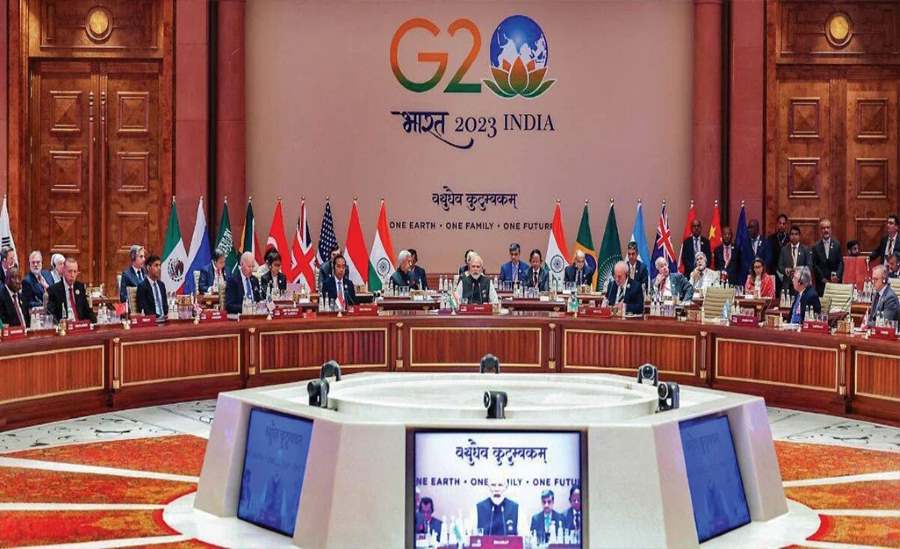
The G20 consists of 19 countries and the European Union (EU) and accounts for about 85 percent of the global GDP, 75 percent of international trade, and two-thirds of the global population. The grouping proved its mettle during the financial crisis of 2008-2009, as it offered a constructive crisis management plan under the G20 Washingt on Declaration. As a core mandate, the forum was also entrusted with the task of “achieving strong, sustainable and balanced growth (with a subsequent reference to ‘inclusive growth’); accelerating and consolidating the post-crisis recovery; and supporting the emergence of new sources of growth.” Apart from meeting economic targets, the G20 is also responsible for taking “action on key global social and environmental challenges, contributing towards the provision of global public goods and subsequently integrating the low-income and developing countries into a sustainable global economy.” To achieve this, G20 members committed to utilizing available monetary, fiscal, and structural policy tools. As the multiple consequences of COVID-19 and the Ukraine crisis and the resultant supply-chain disruptions, spread across the world, questions are being raised about the international community’s capacity to fulfill Agenda 2030 embodied in the Sustainable Development Goals (SDGs). The task is far more difficult for the world. According to the Sustainable Development Report 2022, it is the least developing countries (LDCs) that lack the fiscal capacity to fund emergency response and investment[1]led recovery plans aligned with the SDGs. Indeed, the lack of sustainable financing is a complex bottleneck faced by many developing countries, especially in the aftermath of the pandemic. As a nation committed to democracy and multilateralism, India’s presidency is a significant milestone as it seeks to find practical global solutions for the benefit of all and embody the idea of “Vasudhaiva Kutumbakam,” or “the world is one family.”
India’s Presidency of the G20, “a premium forum for international economic cooperation,” comes at a crucial juncture. It offers New Delhi the opportunity to revise, reform, and redesign development cooperation and set the agenda towards channeling resources for achieving the SDGs. India could also possibly make use of its Presidency to leverage its unique development partnership model and counterbalance China’s growing influence in international development cooperation. Indeed, both China and India play a pivotal role in shaping the global economic discourse and political dynamic, providing alternative sources of financing for developing countries. Beyond the connection to the SDGs, the presidency is characterized by efforts to “narrate the story of India”; by showcasing Indian concepts, such as “LiFE” or digital public infrastructure (DPI), and by organizing the processes of the G20 and its many engagement groups across the entire country.
Given its unique development cooperation model—more precisely, its development partnership model—India has utilized its G20 presidency to push the sustainability agenda before global and national leaders from the Government and corporate world. The G20 has contributed to making India world-ready and the world India-ready. The declaration that the Leaders agreed upon focuses on promoting strong, sustainable, balanced, and inclusive growth. It seeks to accelerate progress on SDGs and has come up with an action plan accordingly In the G20 India Summit that took place on 8-10 September 2023 in New Delhi, the following areas aligned with SDGs were focused on and discussed…. Culture under India’s G20 Presidency: India firmly believes in the philosophy of Va s u d h a i v a Kutumbakam – the earth is one family – the concept that all individuals are collectively responsible towards each other and their shared future.
This shapes India›s vision of sustainable living. India’s G20 Presidency also aimed to nurture, celebrate, and incorporate the cultural diversity of the member states while striving towards achieving holistic living and building a pro-planet society. The Sustainable Development Goals for G20 2023: The 2023 Action Plan will be focusing on actions in the areas that would have a transformative impact on accelerating progress towards achievement of all SDGs – including digital transformation; gender equality and empowerment of women; and implementing sustainable, inclusive and just transitions globally, while leaving no one behind. M a k i n g t h e E a r t h M o r e Sustainable: “Sustainability – Climate Sustainability and Energy” : The G20 recognized the importance of collective action in tackling environmental challenges and climate change while promoting transitions towards more flexible, transparent, and cleaner energy systems The Role of the G20 in Improving Good Health and Well-being ( “SDG 3”): India’s G20 Presidency is a medium of change towards more resilient, responsive, and sustainable health systems and to advance previously e s t a b l i s h e d G 2 0 p a n d e m i c preparedness efforts. G20 can help shape a global health agenda focused on ensuring universal, affordable, and quality health services. Some of the other key issues laid out by the Indian delegation include digital public architecture, virtual digital assets, climate financing for developing nations, reforming multilateral development banks, improving financing methods for urban i nf ra s t r u c t u re , a n d t h e d e bt vulnerabilities of distressed low and middle-income groups. Besides this, the Indian delegation including senior leaders and Sherpa G20 covered six priorities with the global leaders and it included sustainable development goals (SDGs), Green development, MDB reforms, digital public infrastructure, and gender equality, drawing on the outcomes from the various working groups.
In addition, the global leaders were apprised about “What Businesses Want” derived from the B20 India Summit that took place from 25-27 August 2023 and the recommendations collectively given by the business leaders are.
- There is a need for improving service trade and enhancing technology in trade.
- The rollout of digital public infrastructure to boost financial inclusion and healthcare access.
- Accelerate the net-zero transition through a harmonized international carbon market. Harmonizing cybersecurity standards and data privacy regulations.
- Allow for cross-border R&D and technology transfer of best practices.
- A universal labour information management system.
The B20 also proposed that the leaders establish a few institutional mechanisms. These include a B20 Global Institute to pursue the recommendations made, financing decarbonization, putting in place a Global SDG Acceleration Fund—a credit enhancement fund to draw in private capital for more public resources and achieving 2030 targets— and a compendium of best practices on innovation projects to serve the people and planet. The National and International delegations joined hands and took the pledge to work together on achieving SDGs and the areas of concern as discussed in B20 India and G20 India Summits. The Sustainable Development Goals (SDGs) were adopted by 193 UN members in 2015, and they went into force on January 1st, 2016. The 2030 agenda for sustainable development, which has 169 targets and 17 Sustainable Development Goals, aims to create a more secure world by 2030. SDGs also called “Global Goals” and these goals are the successors of the Millenium Development Goals (MDGs) which were introduced in the year 2000. There were eight Millennium Development Goals (MDGs) that were to be achieved by the year 2015 but till 2015, these goals were achieved unevenly therefore, these goals are extended up to 2030 with the new name Sustainable Development Goals which include 17 Goals. Corporate social responsibility (CSR) is a strategy undertaken by companies to not just grow profits but also to take an active and positive social role in the world around them. The term is also associated with the related term corporate citizenship.
The CSR policies used by Indian businesses discovered that businesses made significant contributions to the social, educational, and healthcare sectors but made very little effort to ensure environmental sustainability. The investigation discovered that no company was making contributions to SDGs No. 13 (Climate Action) and No. 14 (Life below Water). Begum (2021) explored how corporate social responsibility contributed to society’s improvement during the COVID[1]Pandemic. CSR efforts assist businesses as well as the nation as a whole. It aids businesses in fostering consumer loyalty. Many organizations today participate in CSR initiatives. However, there have been a variety of perspectives on CSR. CSR is currently used for national heritage, political empowerment , women’s empowerment, community development, infrastructure development, healthcare, education, and other social purposes. But there are certain places that haven’t been touched. New CSR trends including electricity generating, limiting & checking pollution, and bio-diversity creation should be fostered in the current globalized era. CSR is essential to bringing about changes in the present and accelerating India’s socioeconomic development. The adoption of CSR initiatives has a significant impact on sustainable business strategies. Therefore, CSR is a continuing commitment by businesses to behave ethically and contribute to economic development while improving the quality of life of the workforce and their families as well as of the community and society at large”. In short, the G20 India presidency provided a platform for leading businesses & CSR and the world’s growing economies to join hands and work collectively and ethically to achieve Sustainable Development Goals (SDGs).





















